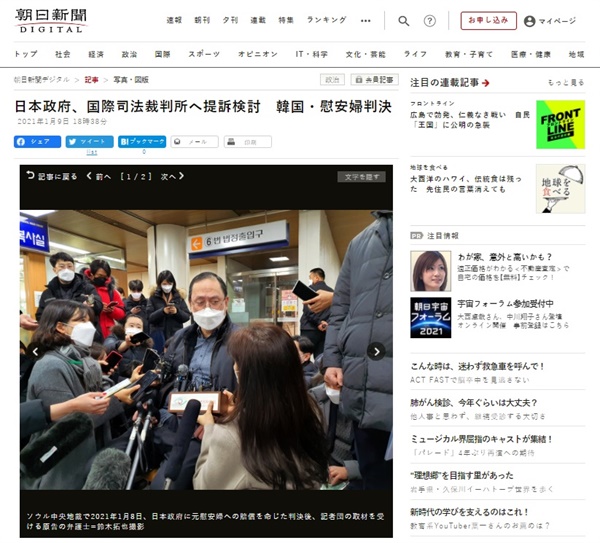 Save.” class=”photo_boder” /> Save.” class=”photo_boder” /> |
|
| ▲ Galmoori reports on the Japanese government’s review of the International Court of Justice (ICJ) lawsuit against the Korean court’s judgment of compensation for damages for comfort women. | |
| Ⓒ Asahi Shimbun |
See related photos |
The Japanese government reported on the 10th that it is considering a method of filing a complaint with the Supreme Court of the United Nations, the International Court of Justice (ICJ), in objection to the Korean court’s ruling for compensation for victims of Japanese military comfort women.
According to the newspaper, a senior Japanese government official said, “The ICJ complaint is a strong option,” and that if the Korean side does not respond, “it will be difficult to enter.”
Earlier, the Seoul Central District Court ordered the victims to pay 100 million won each in the first trial of a lawsuit filed against the Japanese government by 12 victims of comfort women and ruled in favor of the plaintiff.
However, Japanese Prime Minister Yoshihide Suga said, “Under international law, sovereign states do not obey the jurisdiction of other countries,” and “this lawsuit must be dismissed.”
Japanese Foreign Minister Toshimitsu Motegi also did not disclose the ICJ filing policy at a press conference after a telephone talk with Foreign Minister Kang Kyung-wha the day before, but argued that “an abnormal situation that cannot be conceived under international law or bilateral relations has occurred.” did.
<아사히신문>“The Japanese government will make a final decision on whether to file a complaint with the ICJ while watching the plaintiff’s promotion of the Japanese government’s seizure of assets in Korea and the response of the Korean government.”
but <요미우리신문>“There is an opinion within the Japanese government that even if the ICJ is recognized for sovereign immunity from Korea, there is a concern that the comfort women issue may rise again, so it is necessary to be cautious.”
In addition, even if the Japanese government enforces a lawsuit, there is no possibility that a trial will be held unless Korea accepts the ICJ’s’compulsory jurisdiction’.
Unlike Japan, which accepted compulsory jurisdiction, the Korean government joined the ICJ in 1991, but did not accept compulsory jurisdiction in preparation for Japan’s appeal for sovereignty over Dokdo at the time.
Japan has rejected the trial itself with the principle of exemption from sovereignty that’a court of one country cannot judge another country as a party to the lawsuit’ regarding the Korean court’s judgment of compensation for damages for comfort women. Also, according to these principles, it was decided not to appeal against the judgment of the first trial.
However, the court did not admit the exemption from exemption, claiming that the comfort women case was a crime against humanity that was widely committed intentionally and systematically by the Japanese Empire.
In addition, in a lawsuit filed against the German government by Luigi Ferini, an Italian prisoner of war forcibly mobilized by Nazis in Germany in 2004, the Italian Supreme Court referred to the ruling of the so-called’Perrini case’ in which the German government recognized responsibility for compensation.
On the contrary, the ICJ gave Germany a hand, saying that although Nazi Germany’s actions are a crime under international law, sovereign immunity is not deprived.
However, Professor Tomoroni Mizushima Nagoya University, a Japanese expert on international law, said <아사히신문>“The sovereign immunity is not an unchanging principle,” he said in an interview with “the situation may change as new precedents accumulate.”
